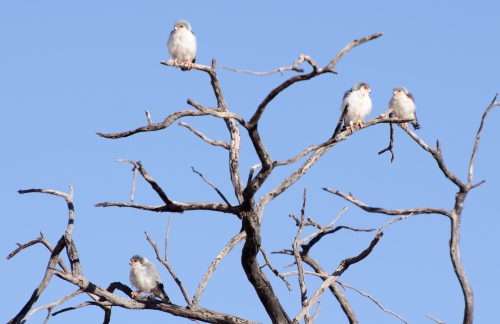Why Africa’s smallest raptor has helpers to raise its chicks

A group of pygmy falcons in the Tswalu Kalahari Reserve in South Africa where UCT researchers conducted a study into the breeding behaviour of these birds.
It takes a village to raise a child – even if you’re the smallest raptor in Africa. According to new research from scientists at the University of Cape Town (UCT), pygmy falcon pairs with more offspring have a better chance of raising healthy chicks when they form groups with helpers.
This recent study is the first to detail the make-up and role of helpers in pygmy falcon nests. The smallest raptor in Africa, the pygmy falcon measures just 20 centimetres long and lives in sociable weaver colonies, together with its weaver hosts.
The research sheds light on a behaviour known as cooperative breeding: a practice where young are raised by their parents and helpers – a phenomenon that puzzles researchers.
The research sheds light on a behaviour known as cooperative breeding: a practice where young are raised by their parents and helpers – a phenomenon that puzzles researchers.
“Why would you help someone else breed instead of breeding yourself?” says the study’s lead author, Dr Diana Bolopo from UCT’s FitzPatrick Institute of African Ornithology. “That is a puzzling question we are nowhere near answering. But this research gets us one step closer with regard to falcons.”
Evolutionary theory suggests that the aim of animal life is to reproduce as much as possible to ensure one’s genes are passed to the next generation. However, the pygmy falcons in this study seemed to have a different agenda.
By monitoring pygmy falcon nests in the South African Tswalu Kalahari Reserve over six breeding seasons, the researchers found that helpers were involved with 19% of nests. And chicks from these nests were healthier as a result, mainly when the groups were raising a large family. “We believe this happens only in big broods because the work required to feed as many as three chicks 10 times a day is greatly reduced when there are three, four or five birds in the group who can help.”

The researchers found that about 25% of the helpers in a pygmy falcon nests were female,
which contrasts with other raptor species where female helpers are relatively rare.
While it seems logical that extra hands would help feed the babies, Bolopo says that’s not the only possible explanation for cooperative breeding. Helpers could play a role in defending the nest from predators or in improving conditions so that mating pairs can produce offspring more often.
“We are able to show that of all the possible explanations for cooperative behaviour, pygmy falcons seem to do it to provide enough food for larger broods and ensure their healthy growth,” she says.
And these healthier chicks stick around to help raise the next generation. The study found that most helpers were offspring that stayed behind, raising the possibility that the extra family members help to ensure the success of their genetic lineage.
“We are able to show that of all the possible explanations for cooperative behaviour, pygmy falcons seem to do it to provide enough food for larger broods and ensure their healthy growth.”
The male–female make-up of the helpers was also noteworthy. About 25% of the pygmy falcon helpers were female, which contrasts with other raptor species where female helpers are relatively rare.
“This work provides some of the first detailed data on the identity of members in the cooperative groups of this charismatic falcon species, which will provide a unique basis to start testing more in-depth hypotheses about cooperative breeding,” says Dr Robert Thomson, a senior lecturer at the FitzPatrick Institute of African Ornithology, who supervised the research.
With cooperative breeding witnessed in a number of animals from meerkats to mongoose and ants, Bolopo says it’s important to understand its benefits and its costs.
“Ultimately, understanding why we cooperate and how it’s evolved is important for understanding all animal behaviour, including humans,” she says.
- Bolopo D, Lowney AM, Thomson RL (2019) Helpers improve fledgling body condition in bigger broods of cooperatively breeding African pygmy falcon. Behavioral Ecology and Sociobiology 73: 16. https://doi.org/10.1007/s00265-018-2630-3
Story: Supplied
Photos: Anthony Lowney
